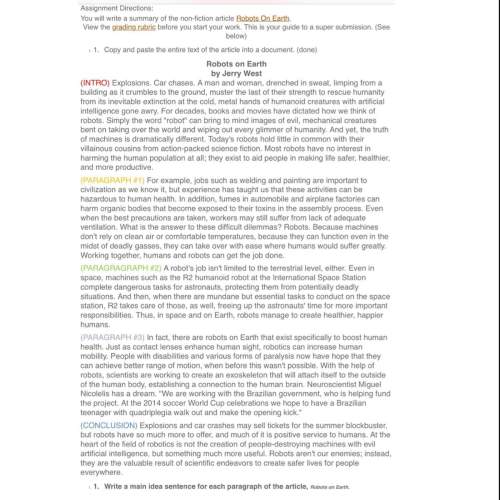
English, 30.06.2019 05:20 joejoefofana
1. choose a film you have seen that has been adapted from a written work. analyze the differences between thetwo versions, and argue which is better and why. you may decide for yourself what "better" means, but make surethat the standards you use to compare the two versions are clear and consistent. support your argument withevidence from both versions. (10 points)

Answers: 2


Other questions on the subject: English

English, 21.06.2019 20:10, Yoma321
Iam for the "immediate, unconditional, and universal" enfranchisement of the black man, in ev [loud applause.] without this, his liberty is a mockery; without this, you might as well almost slavery for his condition; for in fact, if he is not the slave of the individual master, he is the slay liberty as a privilege, not as a right. he is at the mercy of the mob, and has no means of protec how does the repetition of the phrase "without this" support the paragraph's argument? it reinforces the idea that without equality in the us, the idea of a free society is a joke. it suggests that a free society is possible, with or without equal rights for all people. it indicates that douglass would be content without material possessions or status. it proposes that slavery will not be abolished in the us without the support of all citizens.
Answers: 3

English, 21.06.2019 23:30, garciagang0630
With this 3 questions ! really need them right! 1. the first continental congress met in philadelphia on september 5, 1774. all of the colonies sent representatives except georgia. this congress continued in session until october 26, 1774. by then it had passed resolutions calling for a boycott against british trade. the author's main purpose was a. to inform b. to persuade c. to instruct d. to give an opinion 2. identify the point of view of each of the following passages. "my second mate was a round-cheeked, silent young man, grave beyond his years, i thought; but as our eyes happened to meet i detected a slight quiver on his lips. i looked down at once. it was not my part to encourage sneering on board my ship. it must be said, too, that i knew very little of my officers." (joseph conrad, "the secret sharer") a. first person b. third person limited c. third person omniscient d. none of the above 3. identify the point of view of each of the following passages. "he had only himself to in his choice: his fortune was his own; for as to frank, it was more than being tacitly brought up as his uncle's heir, it had become so avowed an adoption as to have him assume the name of churchill on coming of age. it was most unlikely, therefore, that he should ever want his father's assistance. his father had no apprehension of it." (jane austen, emma) a. third person omniscient b. third person limited c. first person d. none of the above
Answers: 1

English, 22.06.2019 02:30, animeisstupid6
The harlem renaissance dawned in an era of pervasive racism and segregation. although legally "free," many african americans were still bound by ideas that had their roots in the slavery of earlier centuries. identity and freedom are important ideas presented in many of the poems from the harlem renaissance. furthermore, the values of identity and freedom are not unique to particular times and places. as hughes expresses in "dream variations," all humans want to be able to develop their identities in freedom. what role does freedom play in the poems you read in this unit? what is required of a society to enable each individual to be true to his or her identity and be free to live by that identity? write about at least three of the poems, describing how the poet uses imagery to depict freedom and identity, the lack of it, or the desire for it.
Answers: 3

English, 22.06.2019 03:20, MathChic68
If you begin to question the validity of the catholic church's teachings, then you could be considered a
Answers: 1
You know the right answer?
1. choose a film you have seen that has been adapted from a written work. analyze the differences be...
Questions in other subjects:


Mathematics, 24.07.2019 04:30







Mathematics, 24.07.2019 04:30

English, 24.07.2019 04:30




